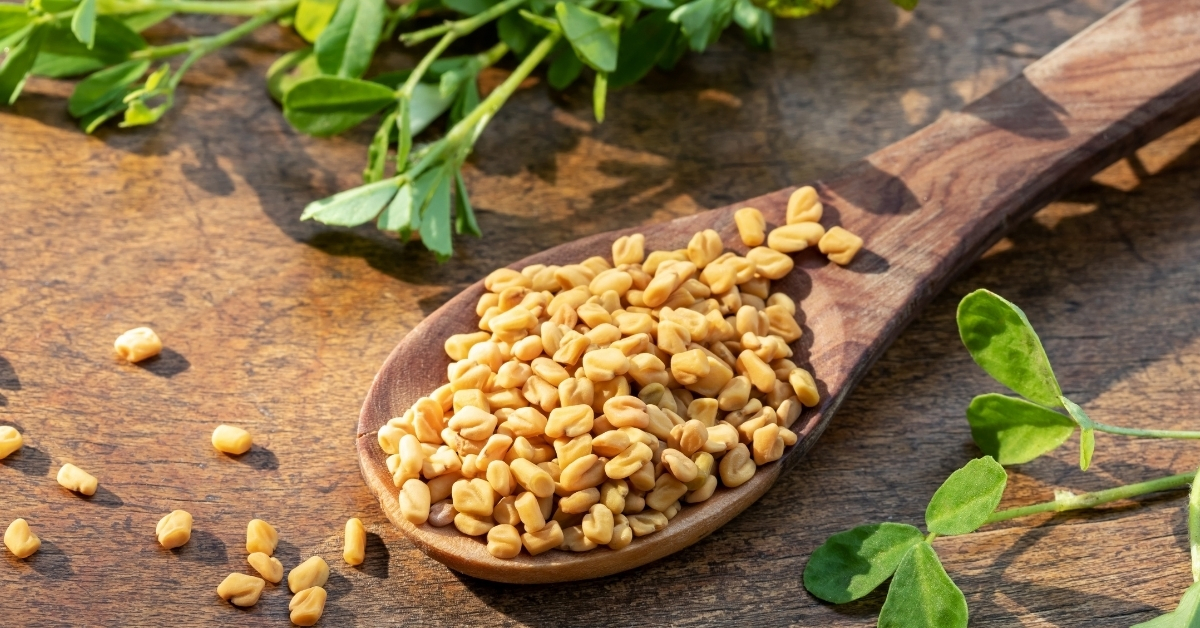In this monograph about fenugreek:
📖 Introduction | 🌱 Botanical Description | 📜 Traditional Uses | 🔍 Phytochemistry | ✨ Applications and Uses | 🛡️ Safety Profile
📖 Introduction
Fenugreek (Trigonella foenum-graecum) is a versatile herb known for its culinary and medicinal properties. It has been traditionally used in various global herbal medicine practices, particularly for its ability to support digestive and respiratory health.
| English Name | Fenugreek |
| Latin Name | Trigonella foenum-graecum |
| Parts Used | Seeds, leaves |
| Traditional Uses | Supporting digestion, enhancing lactation, reducing inflammation |
| Herbal Actions | Demulcent, expectorant, diaphoretic, hypoglycemic |
🌱 Botanical Description
Scientific Classification
Fenugreek is part of the Fabaceae family.
Physical Characteristics
The plant features small, oblong leaves with yellow-white flowers and long, slender pods that contain distinctive, aromatic seeds.
Natural Habitat and Cultivation Details
Native to the Mediterranean region, fenugreek grows well in arid climates and is commonly cultivated in regions of India, North Africa, and parts of the USA. It requires full sun and well-drained soil.
📜 Traditional Uses
Traditionally, fenugreek has been used to support lactation, improve digestion, and as a general tonic to improve health. Its use in folklore includes being a remedy for managing skin conditions and sore throats.

🔍 Phytochemistry (Active Constituents)
Fenugreek seeds contain several active compounds that contribute to their therapeutic properties:
- Mucilage: A soluble fiber that helps soothe irritated tissues and is effective in digestive support.
- Saponins: Compounds known for their immune-enhancing and cholesterol-lowering effects.
- Flavonoids and Phenolic Acids: These antioxidants provide anti-inflammatory benefits and support overall health.
✨ Applications and Uses
Fenugreek is utilized in herbal medicine to:
- Support lactation: It is popular among breastfeeding mothers to help increase milk production.
- Digestive health: The mucilage content aids in soothing the gastrointestinal tract, relieving constipation and gastritis.
- Respiratory health: Traditionally used as an expectorant, it helps to clear mucus from the bronchial tubes, though more scientific evidence is needed to support this use fully.
- Metabolic health: Research supports its potential to aid in metabolic conditions, including diabetes, by helping regulate blood sugar levels.
🛡️ Safety Profile
Fenugreek is generally safe for most adults when used in moderation.
However, due to its potent properties, it can interact with blood-thinning medications and may cause mild gastrointestinal upset when consumed in large amounts. Pregnant women should use caution with fenugreek due to its potential effects on hormonal levels.
Always consult a healthcare provider before starting any new treatment with fenugreek, especially if you are on medication or have underlying health conditions.
📃 Related Posts
🌱 Related Herbs

